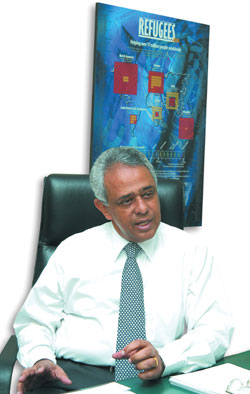|
|
Nepali Times: There is a climate of fear and intimidation in the camps. How do you assess the security situation right now?
Abraham Abraham: I think it is relatively calm at the moment. We had a little bit of upheaval few weeks back. We are working closely with the government to ensure safety and security in the camps at all times. The government is dealing with beefing-up security in the coming days. This is fundamental to creating an environment free of intimidation and threats, so the refugees are not fearful of whatever decisions they may have to take with regard to their future.
What is the role of UNHCR in the resettlement process?
Resettlement is not unique to Nepal. Worldwide, UNHCR has to deal with referrals of cases to resettlement countries.
Is the Home Ministry moving forward on resettlement?
I believe the Home Ministry is dealing with this as we speak. They should also issue a policy directive on resettlement. We are in close contact to ensure that this policy statement also reaches ordinary refugees, so all know that this is a decision of the government of Nepal to move forward with third-country resettlement.
Has UNHCR been working with ordinary refugees on this?
Not yet. We have developed a communication strategy and a plan of action to communicate very clearly to the refugees what resettlement entails and what it is all about, including their personal interest in knowing more about resettlement. We will deliver such messages so all refugees can make an informed decision.
Are you encouraging refugees to opt for resettlement?
We don't encourage or tell anybody what decision they should take. This is the decision of individuals. All we do is inform them about voluntary repatriation. In this case the door has not yet been opened. Local integration is not an issue because nobody has, in a broad sense, requested that as a solution. The only door really open is that of third-country resettlement. As long as there is this option, we'd like the refugees to decide whether or not they'd want to be resettled. But we are not going to force them. We have not started this process of determining their interest, [we will wait] until we have worked out the modalities for taking this forward with the Nepal government.
Will the polarisation in the refugee leadership affect the quest for a durable solution?
I think this is free, democratic expression. I would not see it as polarisation. There are people who want to be repatriated, some want to be resettled, some would like to stay here. I see it more as individual interest and individual conviction. To that extent we have no problem at all.
But didn't the tense security situation in the camp result from this difference of opinion?
Maybe. That's why we say there is no need to intimidate and threaten. I think everywhere refugees should have the right to make their own decisions about their future. We don't want to influence them in any way. We inform them about their rights as refugees, what they can expect in terms of solutions, and what these solutions mean so they can take their own individual decisions.



